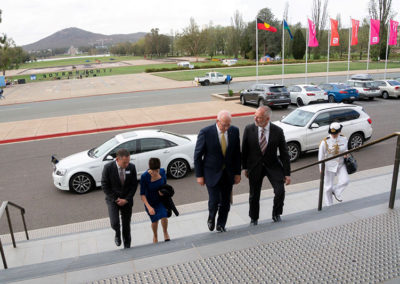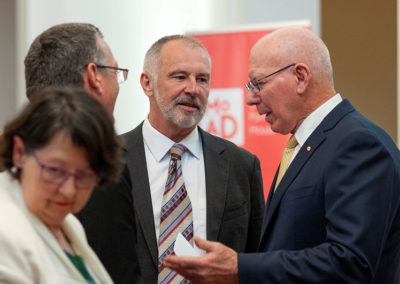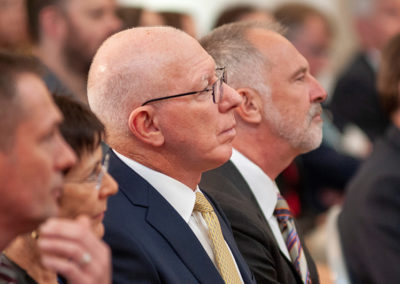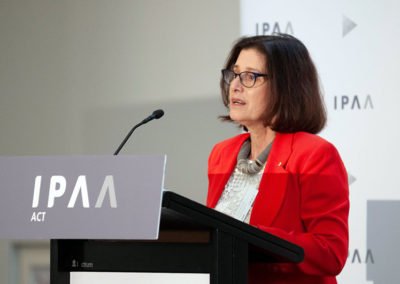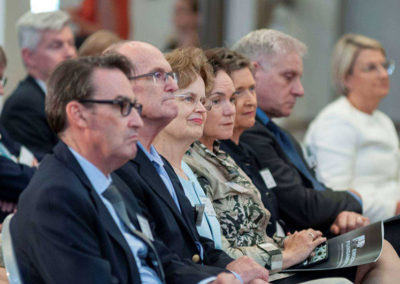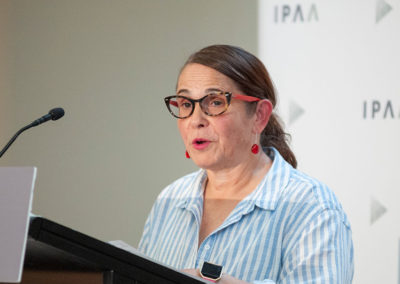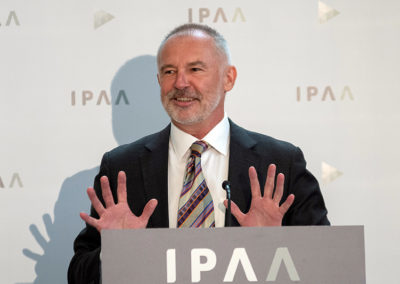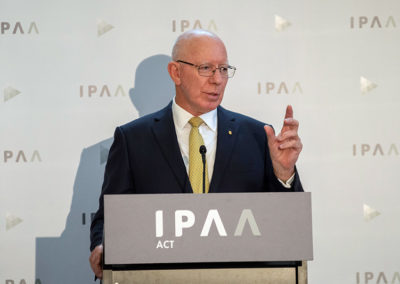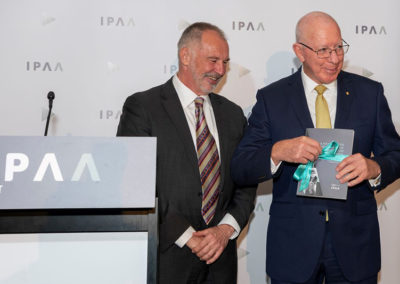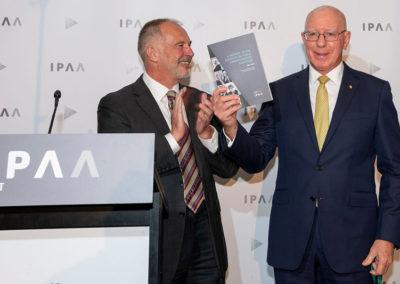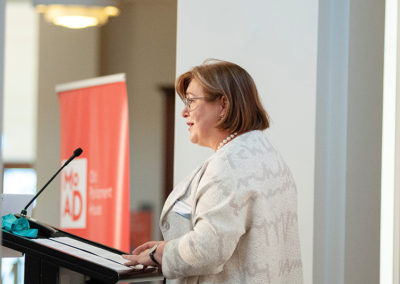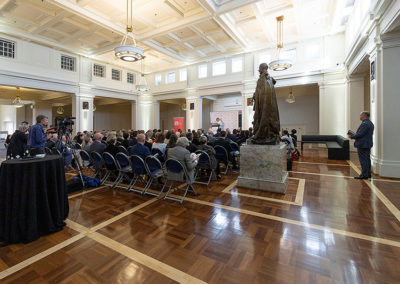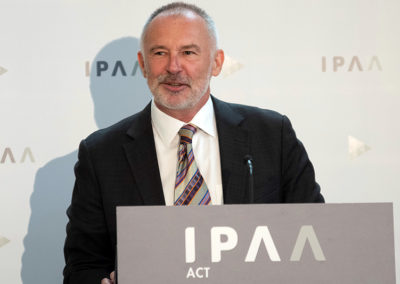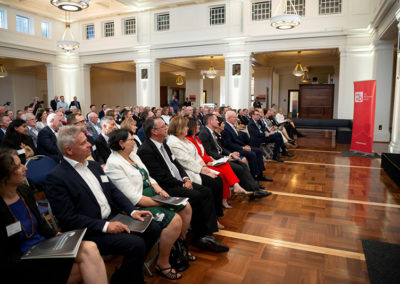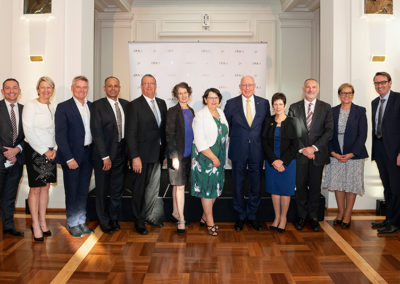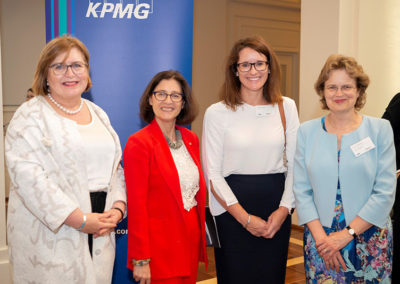Governor-General celebrates IPAA Anniversary with those “who helped shape Australia”

His Excellency General the Honourable David Hurley AC DSC (Rtd), Governor-General of the Commonwealth of Australia, delivers his keynote address at IPAA’s 40th Anniversary Commemorative Event held on 18 February 2020.
On a balmy Canberra evening, His Excellency General the Honourable David Hurley AC DSC (Rtd), Governor-General of the Commonwealth of Australia, and Her Excellency Mrs Linda Hurley, were greeted at the steps of Old Parliament House by Dr Gordon de Brouwer PSM FIPAA, National President of the Institute of Public Administration Australia (IPAA), and Drew Baker, Chief Executive Officer of IPAA ACT.
Waiting for Their Excellencies within Kings Hall were over 100 distinguished guests who had assembled to commemorate the 40th anniversary of IPAA as an independent national organisation. Counted among their number were Presidents of IPAA State and Territory Divisions, Departmental Secretaries from the Australian Public Service, senior public sector leaders, former national and divisional presidents of IPAA, leading public administration academics, as well as fellows of IPAA and individual members from across Australia.
The official proceedings begin
Proceedings began with a welcome from Daryl Karp AM, Director of the Museum of Australian Democracy at Old Parliament House.
“It is fitting that we are gathered here tonight in the iconic Old Parliament House — where parliament and administration have so often gone hand in hand — as we commemorate the 40th Anniversary of the Institute of Public Administration Australia.”
She then invited Ngunnawal elder Aunty Jude Barlow to provide a Welcome to Country. As part of her Welcome to Country Aunty Jude paid tribute to the integrity, honesty and ethical work of IPAA in its support of the profession of public service in Australia.
Aunty Jude was thanked by Gordon de Brouwer who paid his respects to the Ngunnawal people, their elders past and present, and to any Aboriginal and Torres Strait Islander people in attendence.
He then paid tribute to the array of eminent guests in attendance — “people who love public service and administration” — before describing the emergence of IPAA as a national organisation on 1 January 1980 under the leadership of its first National President Duncan Steele Craik CB OBE.
Gordon paid particular tribute to the leadership of the many National Presidents who followed in Duncan’s footsteps, and made special mention of three former National Presidents in attendance — Sue Vardon AO, Professor Andrew Podger AO and Terry Moran AC.
“While I have the role of National President, and IPAA is itself a national organisation with a National Council, we are very much a confederation… and I like that.
…our success lies in our diversity and our willingness to collaborate and work together respectfully and strategically on issues of national significance to our members.”
Gordon introduced His Excellency the Honourable David Hurley AC DSC (Rtd) the Governor-General of the Commonwealth of Australia, and invited him to deliver a keynote address.
An Address by His Excellency General the Honourable David Hurley AC DSC (RTD), Governor-General of the Commonwealth of Australia
His Excellency began his address by thanking Aunty Jude for her “very gracious welcome to country” and joined in acknowledging the Ngunnawal people, thanking them for “their custodianship of this beautiful part of our country for generation after generation” and paid his respects to elders and leaders past and present.
His Excellency also acknowledged the distinguished guests in attendance who, he said, “have really, individually and collectively, helped shape Australia to be the country it is today… we are very grateful as a nation for your hard work”.
His Excellency reflected on the spirit of service on show in the past months:
“In the last month and a half — or since October I dare say — we have been interacting with public services in a number of guises as we have dealt with the bushfires as they occurred, and the aftermath of the bushfires.
So, those in uniform serving state and country, and then those who are bit invisible behind the uniforms… the public service effort that goes into developing both immediate response and longer-term recovery is just enormous… it’s an untold story…
…as soon as a fire goes through a community the first question is: ‘Where is the support?’ and ‘How is a government decision and the agencies that support it move into our community to help us get back on our feet?’.
How that is conducted sets the tone, of course, for the recovery — both mentally and physically — of communities.
We have met some beautiful people out there in the field — who are engaging with people who are in… deepest despair — and they’ve got a personal touch, they understand their policy and the resources they bring to the issue, and they deliver effectively. And the states, in particular I think — who’ve been affected — I think should be particularly proud of that, in the way the recovery effort is going on.
I think it’s a very visible reminder that public service does matter to individuals in our country.”
He then turned his focus to the service delivery challenge put the Australian Public Service by the Honourable Scott Morrison MP, Prime Minister of Australia:
You’ll… no doubt be all aware of what the Prime Minister — the directions he gave to the Public Service quite recently… and I like the line which has got a bit of military taste to it: ‘a clear line of sight between what you are doing every day… straight through to the Australian people’.
And ‘It’s about the implementation… We need a step-change in service delivery’. I think he was pretty crystal clear on his expectations in that speech.
So improve service delivery is his core challenge to the Public Service today… and of course how that service delivery change is achieved is in your hands. He’s been very frank about that as well…
… a question that’s out there at this present time, that comes from the comments of the Prime Minister, asking you to look at the models that we have in place at the present time: ‘How efficient and effective are they in delivering government policy?’.
I think it will be a robust discussion — because I know most of the people in the room who are going to be participating in it — and I think that is good because the Australian public deserves that.
And then to the question of public trust:
“In all of this, building up trust with the Australian people is absolutely critical. And I think if you look back on the 40-year history of IPAA, that is one of the things you have been trying to ensure is a key characteristic of public service and therefore of public administration in our country.
Being non-partisan, being apolitical — membership across the country at different levels of government — you are able to bring so many perspectives to public administration in our country.”
His Excellency drew the attention of his audience to the experience and words of another general on the need for plain-speaking:
“General Sir John Monash came back from the First World War and he became a public servant in Victoria.
He gave some advice to his staff on what he thought sound public administration looked like. And he said, ‘I don’t give a damn for your loyal service when you think I’m right. When I really want it most is when you think I’m wrong’.
Now he was known for plain speaking and I think that’s fairly plain.
And you’ve heard that expressed in so many different ways by Ministers and others in the past. But that’s the art of it isn’t it?
When you’re in those difficult situations, when you’ve got a view to express that must be expressed and not just for your department but again, for the people of our country.”
His Excellency said he was very pleased when asked to write the Foreword for ‘A History of the Institute of Public Administration, 1980–2020’:
“I wasn’t a public servant in the classical sense myself. Of course I wore a uniform. But we all served.
And I have been fortunate to serve alongside some magnificent public servants over my time.
And to be tutored by some, lectured to by some, assisted by some, and guided by some. But all of it invaluable experience, and from people I deeply respect.”
He then turned to the challenges of the here and now:
“Today of course the world is pretty much changed in every sense from 1980.
The challenges you face with the way technology has moved forward, the expectations of the public in how service delivery will occur, and trying to shape our way in a really complex environment — particularly with technology, and how it influences what we do, is difficult work.
I think the reflections in the book will be helpful, but the brains in the people sitting here today will be more helpful as we go forward.
The public’s expectation of you is very high and rightly so and will remain that way, but with IPAA’s support, the effort that goes into it, the people that are members and the way you are shaping our future, I am sure that the public service will continue to deliver to the high quality outcomes and outputs that we have seen in the past.
So congratulations for your 40th Anniversary. As I say, a real pleasure for me to be part of the occasion today to launch the book.”
A History of IPAA is launched
Gordon de Brouwer joined His Excellency to launch ‘A History of the Institute of Public Administration Australia, 1980–2020’ and provided some background on the book’s origins.
“Before I ask you to untie the ribbon and formally launch the book… I’ll explain where the book came from and why it exists.
It began really from a desire to share the history of IPAA on the national website and the person who took this on themselves to do was Frank Exon, the Executive Director of IPAA National, and he drew this work together…
…IPAA’s story reflects that of the public sector and the story of the dedicated women and men who have passionately worked to improve the study and practice of public administration.
Gordon thanked Frank for his work on the publication as well as the many people from IPAA Divisions who had contributed to the history.
His Excellency also thanked Frank for his work — “There’s a labour of love in here and I am sure a great gift to the organisation and the public service in general” — before untying the ceremonial ribbon to launch the history.
Vote of Thanks
Cath Ingram FIPAA — ACT Chair and Lead Partner, Federal Government KPMG and IPAA ACT Councillor and Board Member — delivered a vote of thanks to His Excellency.
“I am actually deeply honoured to be part of this celebration on this very special occasion.
Firstly, thank you to IPAA for affording me this very privileged opportunity to extend a vote of thanks and our gratitude to His Excellency General — our Governor-General — the Honourable David Hurley the Governor-General of the Commonwealth of Australia for your keynote address.
I think 40 years is a great milestone by any measure… [IPAA is] a very unique organisation that sponsors continuous improvement, excellence and professionalism in the public service… I think that’s something that you should all hold very dear.
…It gives us an opportunity, [with] the publication today, to rejoice in the collective talent and goodwill of the public service and, Your Excellency — I think it’s fair to call out — you’re an epitome of public service… You have served the nation for 42 years in the army, as Governor of New South Wales, and now proudly as Governor-General of the Commonwealth of Australia, and you really do provide that deep stewardship, strong legacy, and I think an anchor at these times of change.
So, in closing… it is my great honour to offer a vote of thanks to Your Excellency on behalf of IPAA and all the distinguished guests here today, we thank you for your keynote address and really making this launch of IPAA’s National 40th Anniversary commemorative publication a symbolic event, and something that we will celebrate and revere.
So thank you so much.”
Gordon de Brouwer speaks on the future of IPAA
Gordon de Brouwer then spoke to the future of IPAA, referencing the discussions held at a roundtable earlier in the day with the Presidents of State and Territory Divisions, and their forward national work plan:
“We really had a good discussion around what are some of the substantive issues that we share across the various jurisdictions that really matter to the well-being of the people of our jurisdictions.
That bundle of issues ranges from… ‘What’s actually the purpose, and role, and value, of the public service, of public servants?’. And also, ‘How we build trust with our people, with the people of Australia and the people of our jurisdictions?’
Focusing also very much on… ‘How do we grapple and seize the opportunities that come from technology — especially around the real potency of data and digital to have a positive influence on people’s lives — as part of our role and responsibility of protecting and improving people’s lives?’.
Around the nature of service delivery — ‘What can be done, and very different ways of making that more effective, again, for outcomes?’.
Of thinking around organisation, and structure, and capability in the service, and ‘How we lean in to support that?’.
Around ‘How are we being genuinely strategic in providing advice and implementation to government?’.
So not just the next action or thing, but… ‘What are the steps that support the government in delivering the outcomes that matter to the people of our jurisdictions?’. That’s the focus.
We’re going to work through a program that — sometimes between States and Territories and sometimes nationally that involve National IPAA — but I think there’s a very strong sense… of working together in a cooperative and very collaborative way.
Also, ‘How we lean in and increase our focus and understanding of what’s going on in the world?’… Particularly around Asia, but also the United States and New Zealand.
And ‘How do we build up our engagement and activities with key partners overseas so that we’re really bringing the best of ideas and implementation back to outcomes in Australia?’.
And probably a little bit of housekeeping here and there as well… for good governance and ‘How we improve and strengthen our institutions for good governance? Always a nice way to end.
In his closing remarks Gordon de Brouwer formally acknowledged the “very valuable role” played by Drew Baker, the Chief Executive Officer of IPAA ACT, for the past 5 years:
“He’s moving on, in a month or so, to do a different task.
And Drew — when I was ACT President and certainly as National now — has just done fantastic things for IPAA.
And I’d really ask you that you join me in thanking Drew for everything he’s done over the past years.”
His acknowledgement of Drew was met with resounding applause.
A short video of the IPAA National 40th Anniversary Commemoration can be viewed via the link below as well as a selection of photographs from the evening.
A number of other resources from the evening are available:
- an edited copy of His Excellency’s keynote address
- a high-resolution copy [24MB] of ‘A History of the Institute of Public Administration Australia, 1980–2020’ and a low-resolution copy [2MB]
- a copy of the new brochure Democratic Fundamentals: The Role of the Public Service in Australian Governance, produced by Democracy 2025, which was distributed on the night.

